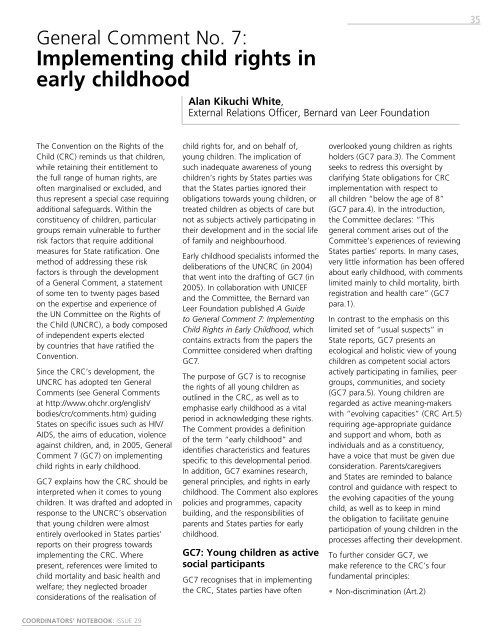A global call to action for early childhood
A global call to action for early childhood
A global call to action for early childhood
You also want an ePaper? Increase the reach of your titles
YUMPU automatically turns print PDFs into web optimized ePapers that Google loves.
General Comment No. 7:<br />
Implementing child rights in<br />
<strong>early</strong> <strong>childhood</strong><br />
Alan Kikuchi White,<br />
External Relations Officer, Bernard van Leer Foundation<br />
35<br />
The Convention on the Rights of the<br />
Child (CRC) reminds us that children,<br />
while retaining their entitlement <strong>to</strong><br />
the full range of human rights, are<br />
often marginalised or excluded, and<br />
thus represent a special case requiring<br />
additional safeguards. Within the<br />
constituency of children, particular<br />
groups remain vulnerable <strong>to</strong> further<br />
risk fac<strong>to</strong>rs that require additional<br />
measures <strong>for</strong> State ratification. One<br />
method of addressing these risk<br />
fac<strong>to</strong>rs is through the development<br />
of a General Comment, a statement<br />
of some ten <strong>to</strong> twenty pages based<br />
on the expertise and experience of<br />
the UN Committee on the Rights of<br />
the Child (UNCRC), a body composed<br />
of independent experts elected<br />
by countries that have ratified the<br />
Convention.<br />
Since the CRC’s development, the<br />
UNCRC has adopted ten General<br />
Comments (see General Comments<br />
at http://www.ohchr.org/english/<br />
bodies/crc/comments.htm) guiding<br />
States on specific issues such as HIV/<br />
AIDS, the aims of education, violence<br />
against children, and, in 2005, General<br />
Comment 7 (GC7) on implementing<br />
child rights in <strong>early</strong> <strong>childhood</strong>.<br />
GC7 explains how the CRC should be<br />
interpreted when it comes <strong>to</strong> young<br />
children. It was drafted and adopted in<br />
response <strong>to</strong> the UNCRC’s observation<br />
that young children were almost<br />
entirely overlooked in States parties’<br />
reports on their progress <strong>to</strong>wards<br />
implementing the CRC. Where<br />
present, references were limited <strong>to</strong><br />
child mortality and basic health and<br />
welfare; they neglected broader<br />
considerations of the realisation of<br />
child rights <strong>for</strong>, and on behalf of,<br />
young children. The implication of<br />
such inadequate awareness of young<br />
children’s rights by States parties was<br />
that the States parties ignored their<br />
obligations <strong>to</strong>wards young children, or<br />
treated children as objects of care but<br />
not as subjects actively participating in<br />
their development and in the social life<br />
of family and neighbourhood.<br />
Early <strong>childhood</strong> specialists in<strong>for</strong>med the<br />
deliberations of the UNCRC (in 2004)<br />
that went in<strong>to</strong> the drafting of GC7 (in<br />
2005). In collaboration with UNICEF<br />
and the Committee, the Bernard van<br />
Leer Foundation published A Guide<br />
<strong>to</strong> General Comment 7: Implementing<br />
Child Rights in Early Childhood, which<br />
contains extracts from the papers the<br />
Committee considered when drafting<br />
GC7.<br />
The purpose of GC7 is <strong>to</strong> recognise<br />
the rights of all young children as<br />
outlined in the CRC, as well as <strong>to</strong><br />
emphasise <strong>early</strong> <strong>childhood</strong> as a vital<br />
period in acknowledging these rights.<br />
The Comment provides a definition<br />
of the term “<strong>early</strong> <strong>childhood</strong>” and<br />
identifies characteristics and features<br />
specific <strong>to</strong> this developmental period.<br />
In addition, GC7 examines research,<br />
general principles, and rights in <strong>early</strong><br />
<strong>childhood</strong>. The Comment also explores<br />
policies and programmes, capacity<br />
building, and the responsibilities of<br />
parents and States parties <strong>for</strong> <strong>early</strong><br />
<strong>childhood</strong>.<br />
GC7: Young children as active<br />
social participants<br />
GC7 recognises that in implementing<br />
the CRC, States parties have often<br />
overlooked young children as rights<br />
holders (GC7 para.3). The Comment<br />
seeks <strong>to</strong> redress this oversight by<br />
clarifying State obligations <strong>for</strong> CRC<br />
implementation with respect <strong>to</strong><br />
all children “below the age of 8”<br />
(GC7 para.4). In the introduction,<br />
the Committee declares: “This<br />
general comment arises out of the<br />
Committee’s experiences of reviewing<br />
States parties’ reports. In many cases,<br />
very little in<strong>for</strong>mation has been offered<br />
about <strong>early</strong> <strong>childhood</strong>, with comments<br />
limited mainly <strong>to</strong> child mortality, birth<br />
registration and health care” (GC7<br />
para.1).<br />
In contrast <strong>to</strong> the emphasis on this<br />
limited set of “usual suspects” in<br />
State reports, GC7 presents an<br />
ecological and holistic view of young<br />
children as competent social ac<strong>to</strong>rs<br />
actively participating in families, peer<br />
groups, communities, and society<br />
(GC7 para.5). Young children are<br />
regarded as active meaning-makers<br />
with “evolving capacities” (CRC Art.5)<br />
requiring age-appropriate guidance<br />
and support and whom, both as<br />
individuals and as a constituency,<br />
have a voice that must be given due<br />
consideration. Parents/caregivers<br />
and States are reminded <strong>to</strong> balance<br />
control and guidance with respect <strong>to</strong><br />
the evolving capacities of the young<br />
child, as well as <strong>to</strong> keep in mind<br />
the obligation <strong>to</strong> facilitate genuine<br />
participation of young children in the<br />
processes affecting their development.<br />
To further consider GC7, we<br />
make reference <strong>to</strong> the CRC’s four<br />
fundamental principles:<br />
• Non-discrimination (Art.2)<br />
COORDINATORS’ NOTEBOOK: ISSUE 29
















